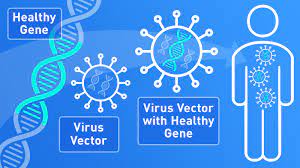Gene Therapy Progress II – Pharma Veterans’ Blog Post #519 by Asrar Qureshi
Gene Therapy Progress II – Pharma Veterans’ Blog Post #519 by Asrar Qureshi
Dear Colleagues! This is Pharma Veterans’ Blog Post #519. Pharma Veterans welcome sharing of knowledge and wisdom by Veterans for the benefit of Community at large. Pharma Veterans Blog is published by Asrar Qureshi on WordPress, the top blog site. Please email to asrar@asrarqureshi.com for publishing your contributions here.
Continued from Previous……
The Human Genome Project, which ran from 1990 to 2003, provided researchers with the basic information about the genetic content of human organism. The discovery opened many new avenues and opportunities in various fields. Healthcare could also be a great beneficiary of genetic research.
National Human Genome Research Institute, working as part of NIH in USA is focused on application of genome knowledge in healthcare. Researchers at the NHGRI are working with patients and families to better understand how genes can cause or influence diseases and develop new and more effective diagnostics and treatments.
A multitude of clinical studies is in progress. These include common diseases like ADHD – Attention Deficit Hyperactivity Disorder, Atopic Dermatitis, Myopathy, Metabolism, Infection, and immunity etc., and several rare diseases. Cancer treatment was among the first fields of research for gene therapy.
Issues with Gene Therapy
Gene therapy has raised questions and issues, both medical and ethical.
• A primary issue is the lack of knowledge about long-term effects of the therapy. It is understandable because the therapy, like COVID vaccines is still new.
• Most gene therapies are short-lived, meaning that the patients need to undergo treatment multiple times. Therapeutic DNA must be functional and stable in the long-term so that it may provide permanent cure. However, it is difficult to integrate the DNA into genome, and most body cells keep dividing rapidly; therefore, the long-term benefits are yet elusive and repeated interventions are needed.
• If one gene mutation is involved in the disease/disorder, it may be more promising to treat. However, diabetes, heart disease and arthritis are caused by alterations in multiple genes. This poses great difficulty in treating such disorders.
• Our natural immune system is designed to react to all foreign bodies getting inside and makes antibodies to combat the invaders. Genes are transported through vectors, most commonly viral vectors. The immune system is likely to recognize vectors as foreign bodies, thus making repeated exposures more difficult.
• The virus used as vector may get activated and pose serious health risk to patients by causing unintended diseases.
• Other unintended outcomes may include toxic, immune, or inflammatory reactions. There may be a risk of inducing tumor growth, if the inserted DNA is incorrectly placed, such as in tumor suppressor gene.
• Three deaths have been reported during gene therapy trials. One was of an 18-year-old being treated at the University of Pennsylvania for an enzyme deficiency. He died four days after receiving the therapy due to severe immune reaction to viral vector.
Ethical Issues
Gene therapy has raised several ethical questions and issues.
• Gene therapy involves making changes to the basic instructions set of our body. It may be used to change certain physical and personal traits. Who will decide about the morality of such changes? Who will decide what is desirable and undesirable?
• Several disorders of mind and body are on the borderline between so called ‘normal’ and ‘abnormal’. Who will decide what is normal and what should be considered a disability?
• Gene therapy is extremely expensive. Will its benefits be extended to wealthy only? What would the poor do?
• Is it ethical to use gene therapy to enhance basic human traits, such as intelligence, height, skin color, or athletic ability?
• Will gene therapy create classes of its own of ‘haves’ and ‘have-nots’?
Another related question is that should changes carried out through gene therapy be allowed to pass on to the next generation(s)? There is a ‘Weismann barrier principle’ put forward by August Weismann that states that hereditary information should only move from genes to cells of the body, and never vice versa. This is to ensure that the effect is not transported to germline. Simply put, it means that gene therapy changes should be barred from passing on to the next generation.
In the last part, we shall review the status of progress.
To be continued……
Disclaimer. Most pictures in these blogs are taken from Google Images which does not show anyone’s copyright claim. However, if any such claim is presented, we shall remove the image with suitable regrets.





Comments
Post a Comment